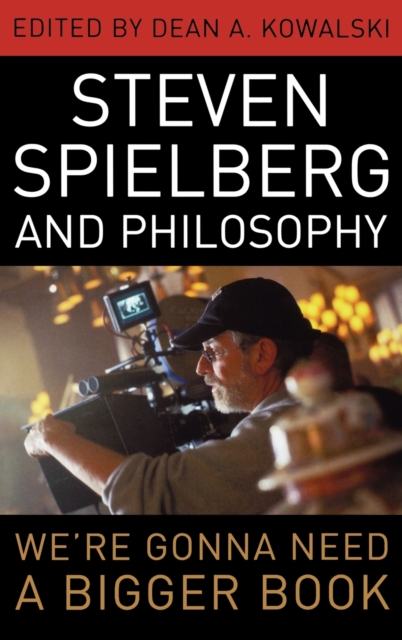Steven Spielberg and Philosophy: We're Gonna Need a Bigger Book

Steven Spielberg and Philosophy: We're Gonna Need a Bigger Book
Without question, few directors have had such a powerful influence on the film industry and the moviegoing public as Steven Spielberg. Often referred to as the most successful American filmmaker of all time, Spielberg has been nominated for the Academy Award for Best Director six times, winning twice-for Schindler's List in 1994 and Saving Private Ryan in 1999. Seven of his films have received the Best Picture Oscar nomination. He has brought to life some of the most popular heroes of all time, such as Indiana Jones, as well as some of the most despised villains, including Amon Goeth from Schindler's List and the killer shark from Jaws. Whatever the subject-dinosaurs, war, extra-terrestrials, slavery, the Holocaust, or terrorism-one clear and consistent touchstone is present in all of Spielberg's films: an interest in the human condition. In Steven Spielberg and Philosophy, Dean A. Kowalski and some of the nation's most respected philosophers investigate Spielberg's art to illuminate the nature of humanity. The book explores rich themes such as cinematic realism, fictional belief, terrorism, family ethics, consciousness, virtue and moral character, human rights, and religion in Spielberg's work. Avid moviegoers and deep thinkers will discover plenty of common ground in this collection.
Has any film director had a greater impact on popular culture than Steven Spielberg? Whether filming Holocaust heroes and villains, soldiers, dinosaurs, extraterrestrials, or explorers in search of the Holy Grail, Spielberg has given filmgoers some of the most memorable characters and wrenching moments in the history of cinema. Whatever his subject -- war, cloning, slavery, terrorism, or adventure -- all of Spielberg's films have one aspect in common: a unique view of the moral fabric of humanity. Dean A. Kowalski's Steven Spielberg and Philosophy is like a remarkable conversation after a night at the movie theater, offering new insights and unexpected observations about the director's most admired films. Some of the nation's most respected philosophers investigate Spielberg's art, asking fundamental questions about the nature of humanity, cinema, and Spielberg's expression of his chosen themes. Applying various philosophical principles to the movies, the book explores such topics as the moral demands of parenthood in War of the Worlds; the ultimate unknowability of the "other" in Close Encounters of the Third Kind and Schindler's List; the relationship between nature
PRP: 139.75 Lei
Acesta este Prețul Recomandat de Producător. Prețul de vânzare al produsului este afișat mai jos.
111.80Lei
111.80Lei
139.75 LeiLivrare in 2-4 saptamani
Descrierea produsului
Without question, few directors have had such a powerful influence on the film industry and the moviegoing public as Steven Spielberg. Often referred to as the most successful American filmmaker of all time, Spielberg has been nominated for the Academy Award for Best Director six times, winning twice-for Schindler's List in 1994 and Saving Private Ryan in 1999. Seven of his films have received the Best Picture Oscar nomination. He has brought to life some of the most popular heroes of all time, such as Indiana Jones, as well as some of the most despised villains, including Amon Goeth from Schindler's List and the killer shark from Jaws. Whatever the subject-dinosaurs, war, extra-terrestrials, slavery, the Holocaust, or terrorism-one clear and consistent touchstone is present in all of Spielberg's films: an interest in the human condition. In Steven Spielberg and Philosophy, Dean A. Kowalski and some of the nation's most respected philosophers investigate Spielberg's art to illuminate the nature of humanity. The book explores rich themes such as cinematic realism, fictional belief, terrorism, family ethics, consciousness, virtue and moral character, human rights, and religion in Spielberg's work. Avid moviegoers and deep thinkers will discover plenty of common ground in this collection.
Has any film director had a greater impact on popular culture than Steven Spielberg? Whether filming Holocaust heroes and villains, soldiers, dinosaurs, extraterrestrials, or explorers in search of the Holy Grail, Spielberg has given filmgoers some of the most memorable characters and wrenching moments in the history of cinema. Whatever his subject -- war, cloning, slavery, terrorism, or adventure -- all of Spielberg's films have one aspect in common: a unique view of the moral fabric of humanity. Dean A. Kowalski's Steven Spielberg and Philosophy is like a remarkable conversation after a night at the movie theater, offering new insights and unexpected observations about the director's most admired films. Some of the nation's most respected philosophers investigate Spielberg's art, asking fundamental questions about the nature of humanity, cinema, and Spielberg's expression of his chosen themes. Applying various philosophical principles to the movies, the book explores such topics as the moral demands of parenthood in War of the Worlds; the ultimate unknowability of the "other" in Close Encounters of the Third Kind and Schindler's List; the relationship between nature
Detaliile produsului









